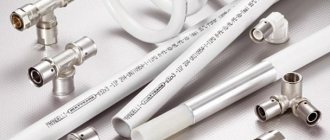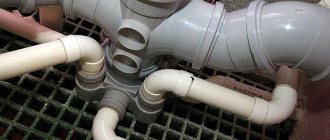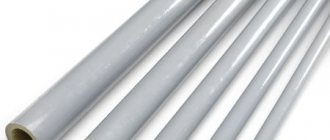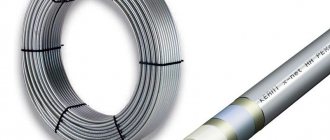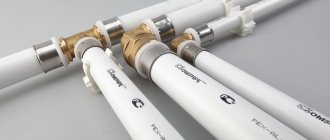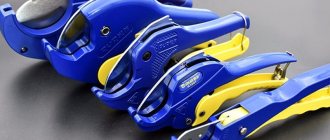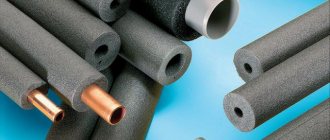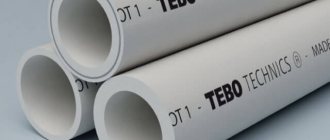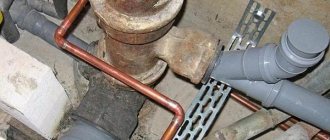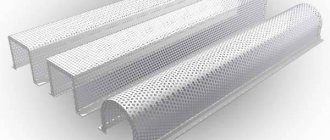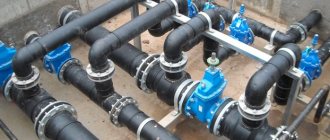Metal-plastic pipes can be used in domestic and industrial construction of water supply systems, heating systems, heated floors, as well as for connecting gas supplies. They are durable, practical, easy to install and at the same time have an affordable price.
Metal-plastic pipes and fittings
The choice of manufacturers of these products is quite large and developers are often faced with the question: what is best to purchase for installation in a house or apartment.
Major manufacturers of metal-plastic pipelines
Regardless of what brand of metal-plastic pipes you purchase, this is a high-quality and reliable material that is resistant to various external influences. All manufacturers of these products strive to maximize the technical characteristics of their products, increase their service life and increase functionality.
Metal-plastic pipes are manufactured by the following companies:
- Valtec;
- Ape;
- Henco;
- Uponor;
- Rehau;
- Kermi;
- Viego;
- Hydrosta;
- Opentrop Copipe;
- Sanha.
Viega metal-plastic pipes
Which brand of pipeline to choose depends on the industry where the products are used, the expected cost, and individual preferences.
Products made in Italy by Valtec and Ape
Valtec piping is made from high quality polyethylene and pure aluminum foil. The strong connection of layers of Valtec brand products guarantees the complete absence of delamination even with repeated temperature changes.
- Valtec pipes are used in the following industries:
- Cold and hot water supply;
- Heating;
- Transportation of carbon fuels;
- Cooling;
- Transportation of food and non-food products in production;
- Heated floor systems.
Metal-plastic pipes VALTEC
A small coefficient of linear expansion allows the use of Valtec lines for laying under a concrete screed, and in addition to this, the positive characteristics include:
- Resistance to corrosion, chemical and temperature influences;
- Long service life of Valtec products, which is more than 50 years;
- Full compliance with domestic and international quality standards, as best evidenced by the certificate of the Research Institute of Plumbing;
- The operating temperature of the Valtec pipeline is 95 degrees.
Valtec is the optimal material for developers who value, above all, the quality of the product, regardless of how much it costs.
Italian Ape pipes can be used in apartments, houses, cottages and various industrial premises. Ape products can be used for the following systems:
- Drinking, cold and hot water supply;
- Heating;
- Conditioning.
Metal-plastic pipe Ape
The Ape pipeline has high ductility and can be installed with a minimum number of components. Ape systems are supplied complete with brass fittings. Ape pipes do not rust, are not susceptible to corrosion and silting. Ape is high quality, affordable price and manufacturer's warranty.
The use of metal-plastic pipes in autonomous and central heating systems
The use of metal-plastic pipes for the installation of heating networks allows you to save time, effort and money and equip a pipeline that has all the positive qualities of metal and plastic.
To obtain such a result, you must, first of all, understand the differences in the operation of central heating and individual heating:
- In a central heating system, a powerful heat-generating device heats a large volume of water. The heated coolant enters houses and apartments at a temperature of 40 to 95 degrees, but with preventive measures, the water supplied to the pipes can have a temperature of up to 150 degrees. The pressure is usually in the range of 4-5 atmospheres, but since an extensive and branched heating network is serviced, water hammers occur in the pipeline - pressure surges when it exceeds the norm by 2-3 times. For metal-plastic, 95 degrees is the operating temperature limit, and water hammer is a threat of instantaneous destruction of the walls, especially at corners and nodes. Therefore, the installation of metal-plastic pipes in rooms receiving coolant from a centralized system is undesirable. However, the above problems can be solved by equipping the pipeline with pressure stabilizers and temperature regulators.
- A small volume of coolant circulates in an autonomous system; temperature and pressure can be adjusted directly on the heat-generating device. Therefore, in houses, apartments, commercial and other buildings with individual heating, metal-plastic can be used without restrictions.
We recommend that you read: How to choose sewer pipes for an external sewerage system
The world famous Henco pipeline
Henco metal-plastic pipes combine all the advantages of metal and plastic pipes better than others. Due to this, they are used in a wide variety of engineering networks, namely:
- Cold and hot water supply;
- Heating;
- Conditioning;
- Heating of staircases, swimming pools, stadiums;
- Technological water treatment systems.
Henco metal-plastic pipe
Henco metal-plastic pipes are electrically safe, silent and easy to install products. The pipeline costs little money compared to how long it will last without the need for regular repairs and without loss of quality.
Installation features
When equipping heating systems, metal-plastic pipes are used for:
- carrying out the main line to which heat-releasing devices will be connected,
- "warm floor" system devices.
We recommend that you read: Which pipe is suitable for installing a heated floor and how to calculate the number of pipes
Installation procedure
In both cases, the general procedure is as follows:
- Markings are applied along the surface along which the pipeline will be laid.
- Cut the pipes into pieces of the required length.
- Lay the pipes according to the markings.
- The pipes are connected with fittings. For hidden installation, inspection windows are installed at the connection points.
- They are fixed to the surface using clips, clamps or, in the case of heated floors, in special backing mats.
- If necessary, finish the surface along which the pipeline is laid. The grooves are closed if the pipes are laid in the walls or ceiling, and the floor is screeded if the heating circuit is laid horizontally.
The bending and joining of pipes has special features, since these operations are of particular importance for the installation and subsequent operation of the pipeline.
How to bend a pipe
There are three ways to rotate or rotate a metal-plastic pipe:
- Manually without auxiliary tools. The pipe is clasped with your hands so that the thumbs located along it are directed towards each other. Bend the pipe slightly and move your hands a couple of centimeters to the side, after which the operation is repeated. So, gradually, in small steps, the desired bend shape is obtained. Achieving accuracy this way is difficult, and pipes often break.
- Manually with auxiliary tools and materials. You can pour sand into the pipe and pull a thick, rigid wire or spring through it. Such filling will allow the effort exerted by a person to be distributed and will prevent the pipe from breaking. Next, the pipe is bent in the same way in small steps; especially strong pipe products are fixed in a vice and only then they begin to bend.
- Using a pipe bender. There are several options for this tool: manual, electric, hydraulic. In a pipe bender, the pipe is clamped between the sole and the rollers: the rollers hold it, and the sole pushes it outward, which is why bending occurs. As with the manual method, it will not be possible to give the pipe the required shape in one go; you will need to perform the operation step by step, bending the pipe at several points. However, a pipe bender will significantly speed up this process and save effort.
Distinctive German pipe quality
Uponor brand pipelines are used in more than 60 countries around the world, thanks to high-quality raw materials and high-tech production. Uponor proves every year that it is significantly better than its competitors and outperforms them in all respects. The main advantages of Uponor products are:
- High quality;
- Safety;
- Easy installation;
- Ease of maintenance;
- High product flexibility.
Uponor metal-plastic pipe
Uponor pipeline diameter ranges from 16 to 110 mm, which allows you to select the necessary material for any communication system. Uponor systems are supplied as a kit with all necessary fittings. This allows installation of the Uponor brand highway to be carried out not only by professionals, but also by anyone interested.
The famous German brand Rehau produces several systems for connecting heating and water supply. Rehau systems are comprehensive solutions that include not only the pipeline, but also fittings, plumbing fixtures and components. The Rehau Rautitan Stabil and Rehau Rautitan Basic systems, which consist of 5 layers, are widely used.
The Rehau pipeline consists of the elements shown in the figure:
Rehau pipeline
Rehau differs from its competitors in the highest degree of cross-linking of polyethylene and the unique property of shape memory. No less important advantages of the Rehau metal-plastic system are:
- Insensitive to scratches;
- Ability to bend without special tools;
- Resistance to high loads;
- Compliance with international quality standards.
The Rehau metal-plastic pipeline has a service life of up to 50 years and improved characteristics in comparison with products made from other materials.
Rating of the best manufacturers of metal-plastic pipes
Our rating includes 11 of the best domestic and foreign manufacturers of metal-plastic plumbing pipes. Their products are known in many countries around the world and have earned the trust of a large number of consumers.
When choosing a specific company, we took into account the range of products, cost, quality and the use of innovative technological solutions.
Our rating will help all people who are planning to replace an old water supply system or are designing a heating system in their private house or apartment from scratch to decide on a specific manufacturer.
| Nomination | Place | Manufacturer | Rating |
| Rating of the best manufacturers of metal-plastic pipes | 1 | Valtec | 5.0 |
| 2 | Rehau | 4.9 | |
| 3 | Ape | 4.8 | |
| 4 | Henco | 4.7 | |
| 5 | HydroSta | 4.6 | |
| 6 | Uponor | 4.5 | |
| 7 | Oventrop Copipe | 4.4 | |
| 8 | Viega | 4.3 | |
| 9 | Nanoplast | 4.2 | |
| 10 | Sanha | 4.1 | |
| 11 | Kermi | 4.0 |
Valtec
Valtec is a Russian brand that appeared on the domestic market in 2002. The company was founded by engineer-entrepreneur P.E. Melnikov, who began serial production of metal-plastic lines, related fittings and engineering plumbing. Most of the products were developed based on our own patented technologies. The impetus for the serial production of metal-polymer communications and other engineering plumbing was the lack of goods of adequate quality on the Russian market and the inability to choose a suitable solution among imported goods due to frequent mismatches in standard sizes.
Initially, the first batches of goods were produced at well-known Italian factories, but over time the company significantly expanded its production base.
Today, Valtec metal-plastic pipes are well known not only in the Russian market, but throughout the entire post-Soviet space.
High quality products, a wide range of products and affordable prices allowed the Russian manufacturer not only to get into our rating, but also to take one of the leading places among domestic and foreign companies producing metal-plastic plumbing communications and related fittings.
According to the company, approximately 40 million meters of Valtec metal-plastic communications are sold annually in Russia.
The company's products are sold through a network of branded representative offices and partner companies, of which there are more than 10,000 in the Russian Federation and neighboring countries.
Valtec metal-plastic lines, related fittings and other engineering plumbing fixtures are manufactured at factories in many countries around the world - Italy, Spain, Russia, China, Turkey, Germany.
Rehau
The German concern Rehau is known not only for its window systems, but also for premium metal-plastic plumbing lines that meet the most stringent European and world quality standards, environmental and sanitary-hygienic standards.
Under the Rautitan brand, the company produces a wide range of plastic and metal-plastic communications for cold and hot water supply and water heating systems. The use of modern technologies has made it possible to achieve high quality cross-linking of polymers (up to 85%), as well as protect the structure from the harmful effects of atomic oxygen, which penetrates the structure of polyethylene and can damage the molecular chains of the material.
Consumers are offered 4 series of metal-plastic plumbing systems - Rautitan Stabil (with an internal aluminum layer, designed for cold water supply and heating) and Rautitan Flex (universal flexible lines), Rautitan His (for heating) and Rautitan Pink (communications with increased strength, designed for heating systems).
We recommend Rehau metal-plastic pipes for installation in any commercial and residential facilities (including hospitals, kindergartens and other institutions with increased sanitary requirements) for their uncompromising quality, innovative technological solutions and long service life.
The guaranteed service life of Rehau metal-plastic pipes and other engineering plumbing equipment is on average 50 years, which is significantly longer than that of competitors (in fact, plumbing communications will last much longer).
Thanks to the smooth inner surface, deposits do not form on it throughout its entire service life, which ensures maximum hygiene.
The first Rehau pipes made of cross-linked polyethylene for low-temperature heating and plumbing systems appeared on the market in 1968, occupying one of the leading positions in their product group.
The Italian manufacturer of metal-plastic pipes Ape began producing its products in the mid-60s of the last century. The introduction of new technologies and modernization of production allowed the company to establish serial production of metal-plastic pipes, press fittings, connecting elements and other plumbing fittings, which differed from competitors in their high level of quality and favorable price.
Since 1998, the company has been implementing the ISO:2002 quality management system, and in 2009 the company received a certificate of conformity to ISO 9001:2008 (the newest standard).
On the domestic market, Ape metal-plastic pipes are presented in 4 diameters - 16, 20, 26 and 32 mm, which makes it easy to choose the appropriate option for arranging highways for various purposes. One of the features of Ape products is versatility, therefore, based on one type of pipe, you can design a hot and cold water supply or heating system.
The inner aluminum layer is butt welded, which not only makes the connection as strong as possible (as opposed to overlap welding), but also ensures a uniform thickness of the outer protective polymer layer over the entire diameter of the pipe. This production technology ensures high pipe strength, good flexibility and reliability.
Ape metal-plastic pipes and related plumbing fittings optimally combine a high level of quality, affordable price and a wide range of products. This allowed the company’s products to successfully conquer not only European markets, but also earn the trust of users in the post-Soviet space.
Ape metal-plastic pipes and related fittings have been certified in many European countries for compliance with regional quality standards, the requirements of which are usually higher than those of pan-European standards.
The company occupies an area of about 140,000 m2, being one of the largest factories for the production of plumbing communications in the EU.
Ape is one of the few companies that has its own laboratory and testing room, where products are tested for durability and tightness of connections under different pressures.
Henco
Henco is a manufacturer of metal-plastic pipes and related accessories from Belgium. The company was founded in 1992 by Lewis Hendricks with production facilities in the suburbs of Antwerp.
One of the distinctive features of Henco products is the ability to create plumbing lines for various purposes with a configuration of any level of complexity. To achieve this, the manufacturer produces an expanded range of fittings and other connecting elements of various configurations for metal-plastic pipes of all diameters.
Henco offers its customers highways with a diameter of 14 to 75 mm with an aluminum layer thickness of 0.4 to 1.2 mm. This choice makes it easy to find the necessary components for organizing water heating and plumbing systems in apartments, private homes or commercial real estate.
We included Henco metal-plastic pipes in our rating not only due to the large range of products, impeccable quality, durability and reliability, but also as an example of a manufacturer that has existed for less than 30 years, and its products are already popular in many countries around the world.
In 2002, the company's plant achieved stable production of metal-plastic pipes of various diameters with a total length of 2.1 million linear meters per week.
Henco is one of the few manufacturers of metal-plastic pipes, fittings and related accessories with a full production cycle and quality control at all stages - from raw materials to finished products.
Henco metal-plastic pipes not only meet European quality and safety standards, but also have many regional certificates in different countries - in the UK (WRC), the Netherlands (KIWA), Ukraine (UkrSEPRO), Germany (DVGW).
HydroSta
HydroSta is a South Korean company engaged in the production of metal-plastic pipes and related accessories. The company offers its users three product lines - traditional metal-plastic pipes with an aluminum layer (heating and drinking water), PVC pipes (technical plumbing and transportation of mildly aggressive chemicals) and stainless steel pipes with a durable polymer coating (hot and cold water supply, heating systems) .
All pipes are produced in different diameters (from 15 to 50 mm), which allows you to select products of the appropriate size to create specific plumbing lines.
We recommend HydroSta metal-plastic pipes and components as one of the best imported systems, most suitable for operation in domestic conditions, taking into account the full compliance of the standard sizes of pipes and adapters with our standards.
HydroSta is one of the youngest manufacturers of metal-plastic pipes among the world leaders (the company began producing this type of product in 1996).
The company opened two large official representative offices in Russia - one in Yekaterinburg, the second in Vladivostok.
The products of the South Korean company meet the requirements of environmental regulations of the Russian Federation and GOST standards, and the production itself is focused primarily on the market of Russia and the CIS countries.
Uponor
The history of the Finnish brand Uponor is closely connected with the development of the Swedish company Wirsbo. Which was the first in the world to produce a polymer pipe made of cross-linked polyethylene in 1972. Already in 1988, Uponor, a company engaged in the production of plastic products, absorbed the Swedish company Wirsbo and entered the market of metal-plastic pipes and related plumbing engineering. Since 2006, all of the concern’s products have been sold under the single Uponor brand, which at that time was already known far beyond Scandinavia.
One of the features of Uponor is that all products are manufactured within one company, without the participation of third parties, which allows us to produce unified integrated solutions for domestic and industrial heating and plumbing systems.
Uponor metal-plastic pipes are highly resistant to oxygen diffusion, retain stable dimensions after installation, bend easily and last for several decades. Consumers have access to pipelines with a diameter of 16 to 110 mm, which allows the creation of engineering plumbing water supply systems and heating water circuits of any size and configuration.
Uponor metal-plastic pipes are known in many countries around the world for their uncompromising quality, durability and reliability. We recommend Uponor products for creating water supply and low-temperature water heating systems of any level of complexity in residential and commercial real estate.
Uponor is one of the few companies whose products are represented in more than 60 countries around the world.
The company's production capacity allows it to annually produce about 100 million linear meters of pipes, millions of fittings and other connecting fittings.
The company invests a lot of money in various environmental initiatives, including its own projects for economical water consumption in everyday life and at work.
Oventrop Copipe
The history of the Oventrop brand begins in 1851, when Arnold Oventrop opened his own private manufactory for the production of products from copper and other metals. Over time, the company repeatedly changes its scope and finally moves into the production of metal-plastic pipes and plumbing fittings in the 80-90s of the last century.
Today, at two German factories in Olsburg and Brilon, the company produces a wide range of metal-plastic pipes under the Oventrop Copipe brand, accompanying fittings for them and other plumbing products.
The company offers its customers three types of Oventrop Copipe metal-plastic pipes - a standard five-layer design (in white), pipes with condensation protection and additional insulation (in gray) and a main line in a protective sleeve (in black).
A wide selection of metal-plastic pipes of different diameters and purposes allows you to quickly select the appropriate option for creating any utility plumbing lines - from cold water supply to radiator heating.
Oventrop Copipe metal-plastic pipes are known for their reliability, high level of quality and durability, which allows them to take an honorable place in our rating.
The company was one of the first in its field to receive ISO 9001 production management certification.
All products are sold through official representative offices of the company on all five continents.
Viega
Viega are German premium-class metal-plastic pipes and related accessories, known in many countries around the world due to their reliability, uncompromising quality and innovative solutions.
The history of the brand dates back to 1899, when German entrepreneur Franz-Alzheim Finger founded a small family business producing diverter fittings for breweries. The growing demand for quality products allowed the business to expand, and soon the company began producing small-diameter copper pipelines and plastic plumbing components.
Since the 90s of the last century, the Viega brand in many countries around the world has begun to be associated with metal-plastic pipes and plumbing fittings in the premium segment. Our own inventions in the pipeline installation system radically changed the plumbing fittings market, making Viega a leader. One example is the Profipress connection system, which does not require soldering of pipes, has high tightness and is easy to install communications.
Viega metal-plastic pipes are widely used to create hot and cold water supply systems, as well as water heating in the residential and commercial sectors.
Our rating would not be complete without the German brand Viega; metal-plastic pipes and plumbing fittings are known in many countries around the world. This is one of the best solutions for arranging plumbing and heating systems of any level of complexity in residential buildings (including multi-storey buildings) and commercial real estate.
In 2021, Viega developed a press system for metal-plastic pipes, which has no analogues in the world. The special design of the fittings reduces the hydraulic resistance inside the pipes, which allows the use of lines with a smaller diameter, and also increases the service life of the entire plumbing circuit.
The company's engineers constantly create innovative products using their own patented technologies, which has made the Viega brand a world leader in its field.
Nanoplast
The Nanoplast plant is a Russian enterprise, which is considered one of the largest domestic manufacturers of metal-plastic pipes and related accessories. The quality of the products meets the requirements of GOST and European quality standards.
For its customers, the company produces Nanoplast metal-plastic pipes in two series - Classic and Premium. The first series presents classic pipes with a reinforcing layer of aluminum up to 0.6 mm thick. The pipes have high performance qualities and are suitable for water supply and heating systems in private houses, apartments and commercial real estate.
A distinctive feature of the Premium line is the use of premium materials (in particular, the new PERT polymer), which significantly improve the technical performance of pipes, increase their reliability and service life.
High quality products, our own innovative developments and favorable prices have allowed Nanoplast metal-plastic pipes to conquer the domestic market and take their rightful place in our ranking.
Nanoplast is one of the few Russian companies that has its own certified laboratory, where new products are developed and prototypes are tested before being launched into series.
The company was the first in Russia to use the second-generation heat-resistant polymer PERT, which made it possible to increase the performance of pipes, including increasing heat resistance to 110 degrees.
The company has implemented a unique automated system for quality control of manufactured products, which operates online.
Sanha
Sanha is one of the leading European manufacturers of sanitary fittings and related products, producing its products since 1964.
The main line of MultiFit-Flex metal-plastic pipes is represented by lines with a diameter of 14 to 20 mm. The pipe has a multilayer composition, inside of which there is a reinforcing aluminum layer. The special design of the pipeline provides it with high flexibility, which is especially important when laying pipelines of complex configurations or in the absence of large space for installation. All pipes are supplied with additional protective insulation (PVC corrugation), which protects the top layer from damage and third-party influences.
More than 8,500 products are produced under the Sanha brand, including metal-plastic and steel lines, connecting elements and other accessories.
All pipelines intended for supplying drinking water do not contain lead, which makes them hygienic and environmentally friendly.
In our review, Sanha metal-plastic pipes take pride of place due to true German quality, practicality and versatility.
Kermi
The German brand Kermi is a derivative of the names of two entrepreneurs - Kershil and Schmidt, who founded the production of fuel tanks in 1960. Over the past half century, the company has significantly expanded its product range and increased its production capacity, taking one of the leading positions in the European market of metal-plastic pipes, shower cabins, heating radiators and related accessories.
There are several types of Kermi metal-plastic pipes on the domestic market, designed for low-temperature radiator heating systems, warm water floors, hot and cold water supply. The use of modern high-tech polymers ensures a perfectly smooth and even internal surface on which sediment or foreign deposits will not accumulate. This makes the lines hygienic, which allows them to be used in pipelines for supplying drinking water.
Modern production technologies and multi-stage quality control ensure that metal-polymer pipes have a service life of at least 50 years.
Despite the fact that Kermi metal-plastic pipes are just beginning to conquer the domestic market, we could not help but include them in our rating due to their increased performance, reliability and durability.
Kermi is one of the few manufacturers that produces metal-plastic multilayer pipes not only for solving specific problems (highly specialized), but also for multi-purpose applications (heating, warm water floors, hot and cold water supply).
Over the entire period of work, more than 50 million flat radiators and more than 10 million shower cabins have been produced under the Kermi brand.
Other manufacturers from Germany
Kermi metal-plastic pipes are also produced in Germany based on innovative developments. The EVON waterproofing layer protects metal-plastic pipes from the destructive effects of oxygen.
The next German-made pipeline is the Viega metal-plastic pipe. Ease of installation and the possibility of subsequent control are ensured by the presence of a special inspection hole on the press sleeve. It is through this that the correctness of the line connection is assessed before crimping.
Metal-plastic pipe Oventrop Copipe
Oventrop Copipe is one of the best pipelines for water supply and heating systems not only in our country, but throughout the world. Oventrop Copipe pipes are available in diameters from 16 to 63 mm and are connected using press fittings. Oventrop Copipe systems are supplied as ready-made kits, which consist of fittings and the pipeline itself.
Oventrop Copipe is excellent quality at an affordable price. The three-layer construction of the Oventrop Copipe pipe is resistant to oxygen diffusion and has a maximum operating temperature of 95 °C.
The Oventrop Copipe system piping is supplied in coils. The kit is completed with press fittings for connecting the elements.
Sanha products are in high demand among consumers. All Sanha products have German quality certificates and are suitable for use in the following utility networks:
- Water supply;
- Heating;
- Cooling;
- Transportation of raw materials in industry.
For the production of Sanha pipes, the latest modified polymers and optimally selected wall thickness of the aluminum layer are used. The design of the Sanha pipeline is shown in the figure:
Sanha pipeline design
Sanha products have many positive reviews among European consumers. The Sanha pipeline provides the following benefits:
- High quality;
- Affordable price;
- Operating temperature up to 95 degrees;
- Maximum pressure 12 bar;
- Long term of use.
Advantages and disadvantages
Metal-plastic pipes have several advantages over components made from other materials
- Simplicity and convenience of installation and pre-installation work. Metal-plastic pipes are easy to transport and store due to their low weight and convenient release form - long-length products are twisted into coils that take up little space. During installation, moving an entire coil requires less effort than moving metal pipes. Cutting and joining metal-plastic products does not require complex equipment or special skills. During installation, flexible and elastic pipes can be rotated at any angle and even turned in the opposite direction without the use of corner fittings. And since metal-plastic pipe products are produced in the form of long lengths of 50-200 m, then few couplings for pipeline equipment are required.
- Possibility of laying pipelines in open and closed ways in rooms, including those with already completed finishing. Metal-plastic pipes have a presentable appearance and do not spoil the interior, and since they are connected without welding, the pipeline can be laid even after finishing the premises.
- Reliability of the formed pipe circuit. Long-distance pipelines are laid with a minimum amount of connecting fittings, therefore they have a minimum of nodes in which leaks are possible.
- Resistance to corrosion and the formation of blockages and growths on the inner surface. Polymer internal and external walls are not subject to corrosion and reliably protect the aluminum reinforcing layer from the inside from the destructive effects of the transported substance, and from the outside - from the external environment. In addition, plastic makes it possible to produce products with absolutely smooth walls, to which small particles moving along with the working medium do not cling, due to which polymer-coated pipes are not prone to overgrowing and silting even in areas of 180-degree turns.
- The ability to absorb sounds and vibrations of a moving work environment. Unlike metal pipes, metal-plastic pipes almost do not allow internal noise to pass out, so they are suitable for installing long thermal circuits even in bedrooms and children's rooms.
- Long service life. If the operating rules are followed, metal-plastic products can last up to 50 years - the polymer shell does not lose its technical properties over time and the aluminum reinforcing layer helps preserve them.
We recommend that you read: Features of using a single-pipe heating system with forced circulation of coolant
However, in some qualities, metal-plastic pipes are significantly inferior to analogues made from other materials:
- Flammability and release of toxic compounds upon fire. Metal-plastic is a fire hazard, so such pipes are not suitable for laying open pipelines in workshops, boiler rooms and other rooms where there are open sources of fire or high temperature.
- Limited scope of application due to a narrow range of operating temperatures and pressures, photophobia and a small standard range of pipes. Metal-plastic cannot withstand temperatures below -40 degrees and breaks, and when exposed to temperatures above +95 degrees for a long time, it becomes deformed; at temperatures above +130 degrees, it begins to melt. The working pressure is limited to 10-20 bar; at higher pressures, deformation of the walls also begins; when it reaches 80-90 bar, the metal-plastic material is destroyed. Metal-plastic products are not applicable for street communications due to the instability of plastic to ultraviolet radiation. The diameter of the pipes is small - from 16 to 63 mm, and the length of the pipe in the largest coil is only 200 m, while the diameter limits of products made from other materials are ten times wider, and the length of polymer pipes in coils can reach a kilometer.
- Narrowing of pipeline capacity at nodal points due to the possibility of connecting pipes only with crimp and press fittings, the fittings of which are installed inside the ends of the pipes. It is impossible to fix a smooth polymer pipe without clamping it between two parts in a fitting.
- Impossibility of executing absolutely reliable nodes. The welding method is not applicable for metal-plastic, since it is not an alloy, but a combination of layers having different melting and ignition temperatures. The fitting connection allows the formation of units, the reliability of which can only be guaranteed for the next 3-5 years. Because of this feature, metal-plastic pipes cannot be laid in a completely hidden way; inspection windows must be left at the joints, and the nodes must be periodically tightened.
Note! To ensure that the use of connecting fittings does not reduce the performance of the system, the circuits are simplified as much as possible to reduce the number of nodes to a minimum, and the circuit is equipped with a pump that maintains the required pressure of the working medium.
Asian products from Hydrosta
Products under the Hydrosta brand are manufactured in South Korea. Hydrosta pipeline is a new generation material for installing heating and water supply systems in residential and industrial premises. Hydrosta products have a diameter from 16 to 50 mm, so it is possible to select the required cross-section for any engineering system.
Hydrosta pipeline design
The main advantages of Hydrosta products are:
- Possibility of installation inside or outside the building, depending on need;
- High strength;
- Lack of oxygen diffusion.
Developers are always interested in how many additional connecting elements will be needed during installation, because the cost of the work directly depends on this. When using Hydrosta piping, a minimum number of fittings will be required. After all, the material is flexible and bendable.
